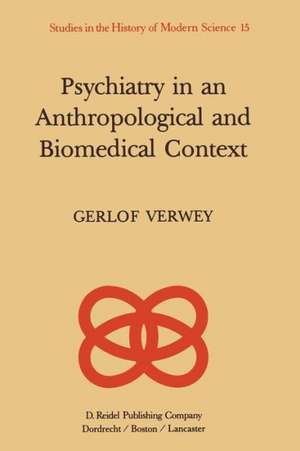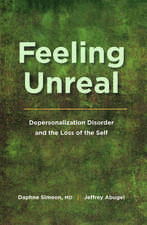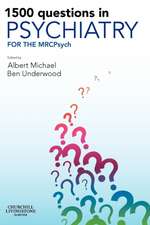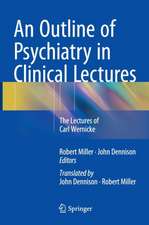Psychiatry in an Anthropological and Biomedical Context: Philosophical Presuppositions and Implications of German Psychiatry, 1820–1870: Studies in the History of Modern Science, cartea 15
Autor G. Verwey Traducere de L. Richardsen Limba Engleză Paperback – 13 oct 2011
Preț: 389.70 lei
Nou
Puncte Express: 585
Preț estimativ în valută:
74.57€ • 78.27$ • 61.89£
74.57€ • 78.27$ • 61.89£
Carte tipărită la comandă
Livrare economică 10-24 aprilie
Preluare comenzi: 021 569.72.76
Specificații
ISBN-13: 9789401088060
ISBN-10: 9401088063
Pagini: 340
Ilustrații: 336 p.
Dimensiuni: 152 x 229 x 18 mm
Greutate: 0.45 kg
Ediția:Softcover reprint of the original 1st ed. 1985
Editura: SPRINGER NETHERLANDS
Colecția Springer
Seria Studies in the History of Modern Science
Locul publicării:Dordrecht, Netherlands
ISBN-10: 9401088063
Pagini: 340
Ilustrații: 336 p.
Dimensiuni: 152 x 229 x 18 mm
Greutate: 0.45 kg
Ediția:Softcover reprint of the original 1st ed. 1985
Editura: SPRINGER NETHERLANDS
Colecția Springer
Seria Studies in the History of Modern Science
Locul publicării:Dordrecht, Netherlands
Public țintă
ResearchCuprins
1: Anthropological Psychiatry in Germany during the First Half of the Nineteenth Century.- 1.1. Introduction.- 1.2. The Rise and Spread of the Anthropological Viewpoint in German Psychiatry from about 1820 to about 1845.- 2: The Mechanistic Viewpoint in Nineteenth-Century Philosophy and Science (Psychology and Physiology).- 2.1. Mechanism: Term and Concept.- 2.2. The Philosophical Background.- 2.3. Kant and the Problem of the Relationship between Philosophy and Science.- 2.4. The Significance of Kant’s Philosophy for the Mechanistic Self-Conception of Nineteenth-Century Psychology.- 2.5. The Implications of the Natural Science Self-Concept of Psychology.- 2.6. Kant and the Problem of the Possibility or Impossibility of Scientific Psychology.- 2.7. Kant’s Influence on the Rise and Development of Nineteenth-Century Scientific Psychology.- 2.8. The Role Played by Physiology in Consolidating the Mechanistic Self-Conception in Nineteenth-Century German Science.- 2.9. Mechanism in Physiology. The Positivist Variant.- 2.10. Critical Positivism and Kantian Critical Philosophy.- 2.11. The Mechanism of Helmholtz, Du Bois-Reymond, Brücke, and Ludwig.- 2.12. Materialistic Mechanism (Vogt, Moleschott, and Büchner).- 2.13. Schopenhauer’s and Lotze’s Criticism of Materialism and its Relevance to the Identification of the Self-Conception of the so-called ‘Materialists’ of the Eighteen-Forties.- 2.14. Schopenhauer’s Criticism of Materialism (in the Proper Sense) and Naturalism.- 2.15. Lotze’s Criticism of Materialistic Methodology.- 2.16. Schopenhauer and Lotze.- 3: W. Griesinger and the Mechanicist Conception of Psychiatry (from about 1845 to about 1868).- 3.1. Griesinger’s ‘Apprenticeship’ (up to 1844).- 3.2. Lotze and Griesinger.- 3.3. Griesinger’sPsychiatry in the Period 1845–68.- 3.4. Griesinger’s Thesis of the Identity of Mental Diseases and Diseases of the Brain.- 3.5. Griesinger and Herbart.- 3.6. Herbart’s Metaphysics and Griesinger’s ‘Empirical Standpoint’.- 3.7. Griesinger’s ‘Ego Psychology’: Assimilation of Herbartian Elements.- 3.8. Griesinger’s Relationship to Institutional Psychiatry.- 3.9. Binswanger’s Relation to (the Tradition of) Institutional Psychiatry in General and to Griesinger in Particular.- 4: Schopenhauer, Rokitansky and Lange: Towards an Explicit Philosophical Justification of German ‘Materialism’ (from about 1840).- 4.1. Schopenhauer and Physiology.- 4.2. Some Aspects of Schopenhauer’s Theory of Knowledge.- 4.3. Rokitansky as an Exponent of Idealistic Naturalism.- 4.4. F. A. Lange (1828–75), Philosopher of Methodological Materialism.- 4.5. Conclusion.- Appendix: Main Lines in the History of Philosophy and Science Leading to ‘Classical’ Medical Anthropology and Anthropological Medicine (Psychiatry) in Germany from about 1780 to about 1820. A Philosophical and Historical Outline.- A1. The Scope of this Outline.- A2. Aristotle and the Beginnings of Anthropology.- A3. The ‘Bio-Logical’ Viewpoint in Aristotle’s Anthropology and Psychology.- A4. The Foundation of ‘Modern’ Anthropology in the Italian Renaissance.- A4.1. The Beginning of the ‘Renewal’ in Christian Humanism and Platonism.- A4.2. Aristotelian Naturalism and so-called Italian Natural Philosophy.- A5. Anthropology as the Empirical Study of Man in the Period from about 1500 to about 1660.- A5.1. The Medical School of Thought (Anatomy, Physiology).- A5.2. The ‘Psychological’ Variant in (Medical) Anthropology in Germany (Sixteenth to Seventeenth Centuries). Descartes as‘Troublemaker’.- A6. Summa Ignorantiae.- Notes.- Text Notes.- Appendix Notes.- Name Index.
Recenzii
`For the reader interested in conceptions of what psychology might be, or in what historically has been thought to be rationally required to make psychology possible, this book is an invaluable resource. For the philosophical issues covered, it is an accurate and sensitive historical guide.'
Medical History (April 1986)
Medical History (April 1986)


























